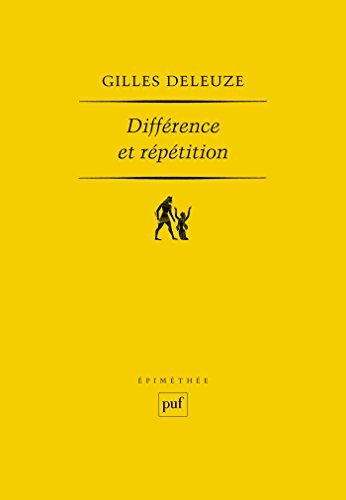What do you think?
Rate this book


Un concept de différence implique une différence qui n’est pas seulement entre deux choses, et qui n’est pas non plus une simple différence conceptuelle. Faut-il aller jusqu’à une différence infinie (théologie) ou se tourner vers une raison du sensible (physique) ? À quelles conditions constituer un pur concept de la différence ?
Un concept de la répétition implique une répétition qui n’est pas seulement celle d’une même chose ou d’un même élément. Les choses ou les éléments supposent une répétition plus profonde, rythmique. L’art n’est-il pas à la recherche de cette répétition paradoxale, mais aussi la pensée (Kierkegaard, Nietzsche, Péguy) ?
Quelle chance y a-t-il pour que les deux concepts, de différence pure et de répétition profonde, se rejoignent et s’identifient ?
548 pages, Kindle Edition
First published January 1, 1968
When we say that the eternal return is not the return of the Same, or of the Similar or the Equal, we mean that it does not presuppose any identity. On the contrary, it is said of a world without identity, without resemblance or equality. It is said of a world the very ground of which is difference, in which everything rests upon disparities, upon differences of differences which reverberate to infinity (the world of intensity). - pp 241
In this sense it is not even clear that thought, in so far as it constitutes the dynamism peculiar to philosophical systems, may be related to a substantial, completed and well-constituted subject, such as the Cartestian Cogito: thought is, rather, one of those terrible movements which can be sustained only under the conditions of a larval subject
A well-known test in psychology involves a monkey who is supposed to find food in boxes of one particular color amidst others of various colors: there comes a paradoxical period during which the number of 'errors' diminishes even though the monkey does not yet posses the 'knowledge' or 'truth' of a solution in each case; propitious moment in which the philosopher-monkey opens up to truth, himself producing the true, but only to the extent that he begins to penetrate the coloured thickness of a problem.
[a] nightmare is perhaps a psychic dynamism that could be sustained neither awake nor even in dreams, but only in profound sleep, in a dreamless sleep. In this sense, it is not even clear that thought, in so far as it constitutes the dynamism peculiar to philosophical systems, may be related to a substantial, completed and well-constituted subject, such as the Cartesian Cogito: thought is, rather, one of those terrible movements which can be sustained only under the conditions of a larval subject. (151)